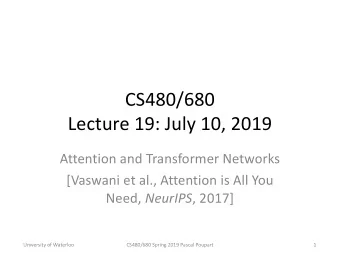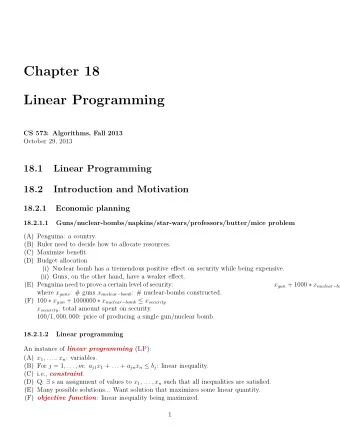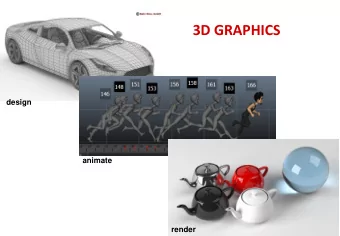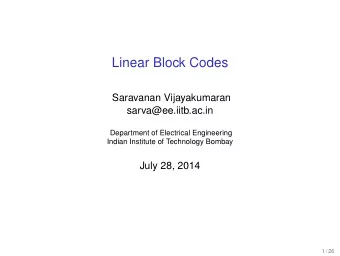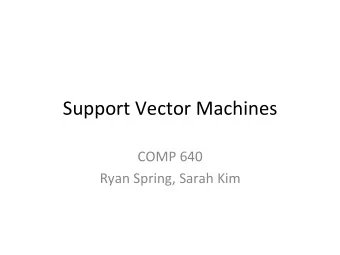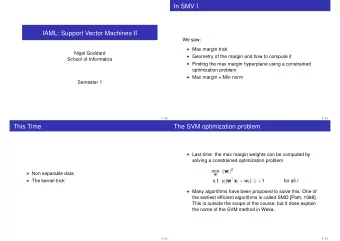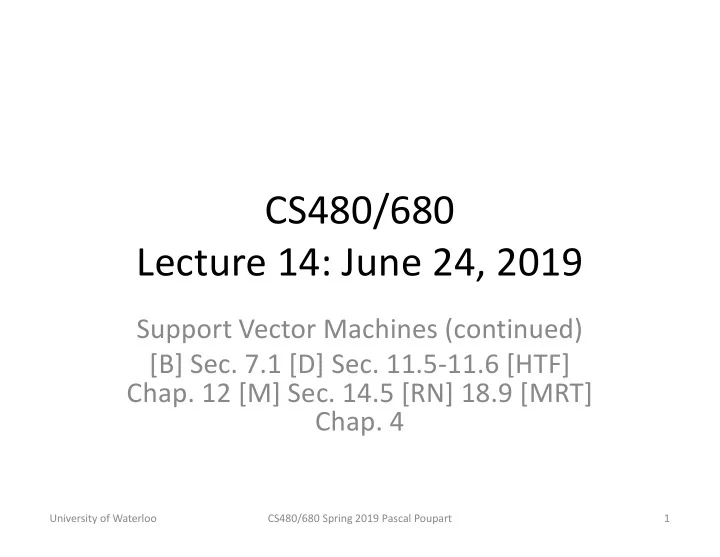
CS480/680 Lecture 14: June 24, 2019 Support Vector Machines - PowerPoint PPT Presentation
CS480/680 Lecture 14: June 24, 2019 Support Vector Machines (continued) [B] Sec. 7.1 [D] Sec. 11.5-11.6 [HTF] Chap. 12 [M] Sec. 14.5 [RN] 18.9 [MRT] Chap. 4 University of Waterloo CS480/680 Spring 2019 Pascal Poupart 1 Overlapping Class
CS480/680 Lecture 14: June 24, 2019 Support Vector Machines (continued) [B] Sec. 7.1 [D] Sec. 11.5-11.6 [HTF] Chap. 12 [M] Sec. 14.5 [RN] 18.9 [MRT] Chap. 4 University of Waterloo CS480/680 Spring 2019 Pascal Poupart 1
Overlapping Class Distributions • So far we assumed that data is linearly separable – High dimensions help for linear separability, but may hurt for generalization • But what if the data is noisy (mistakes or outliers) – Constraints should allow misclassifications • Picture University of Waterloo CS480/680 Spring 2019 Pascal Poupart 2
Soft margin • Idea: relax constraints by introducing slack variables ! " ≥ 0 % " & ' ( ) * ≥ 1 − ! " ∀. • Picture: University of Waterloo CS480/680 Spring 2019 Pascal Poupart 3
Soft margin classifier • New optimization problem: , - ) + 1 1 min ' ( $ 2 $,& )*+ 2 ) $ 3 4 5 6 ≥ 1 − - ) s.t. and - ) ≥ 0 ∀; • where ' > 0 controls the trade-off between the slack variable penalty and the margin University of Waterloo CS480/680 Spring 2019 Pascal Poupart 4
Soft margin classifier • Notes: Since ∑ " # " is an upper bound on the # of 1. misclassifications, $ can also be thought as a regularization coefficient that controls the trade-off between error minimization and model complexity 2. When $ → ∞ , then we recover the original hard margin classifier 3. Soft margins handle minor misclassifications, but the classifier is still very sensitive to outliers University of Waterloo CS480/680 Spring 2019 Pascal Poupart 5
Support Vectors • As before support vectors correspond to active constraints ! " # $ % & ' = 1 − + " – i.e., all points that are in the margin or misclassified • Picture: University of Waterloo CS480/680 Spring 2019 Pascal Poupart 6
Multiclass SVMs • Three methods: 1. One-against-all: for ! classes, train ! SVMs to distinguish each class from the rest 2. Pairwise comparison: train "(! $ ) SVMs to compare each pair of classes 3. Continuous ranking: single SVM that returns a continuous value to rank all classes University of Waterloo CS480/680 Spring 2019 Pascal Poupart 7
One-Against-All • For ! classes, train ! SVMs to distinguish each class from the rest • Picture: • Problem: what if different classes are returned by different SVMs? University of Waterloo CS480/680 Spring 2019 Pascal Poupart 8
Pairwise Comparison • Train !(# $ ) SVMs to compare each pair of classes • Picture: • Problem: how do we pick the best class? University of Waterloo CS480/680 Spring 2019 Pascal Poupart 9
Continuous Ranking • Single SVM that returns a continuous value to rank all classes • Picture: • Most popular approach today University of Waterloo CS480/680 Spring 2019 Pascal Poupart 10
Continuous Ranking • Idea: instead of computing the sign of a linear separator, compare the values of linear functions for each class ! • Classification: , -(/ ∗ ) " ∗ = %&'(%) * + * University of Waterloo CS480/680 Spring 2019 Pascal Poupart 11
Multiclass Margin • For each class ! ≠ # define a linear constraint: & ' ( ≥ 1 & ' ( − $ * $ % ∀! ≠ # • This guarantees a margin of at least 1 University of Waterloo CS480/680 Spring 2019 Pascal Poupart 12
Multiclass Classification • Optimization problem: & % & ∑ ( ) ( min $ , - . / − ) ( , - . / ≥ 1 s.t. ) * + ∀4, 6 ≠ 8 / • Equivalent to binary SVM when we have only two classes University of Waterloo CS480/680 Spring 2019 Pascal Poupart 13
Overlapping classes • Add slack variables: - $,& ' ∑ ) * ) + , - ∑ . / . min 3 4 5 ) − / . 3 4 5 ) ≥ 1 − * ) ∀:, ; ≠ = . s.t. 0 1 2 • Equivalent to binary SVM when we have only two classes University of Waterloo CS480/680 Spring 2019 Pascal Poupart 14
Recommend
More recommend
Explore More Topics
Stay informed with curated content and fresh updates.

![CS480/680 Lecture 9: June 5, 2019 Perceptrons, Neural Networks [D] Chapt. 4, [HTF] Chapt. 11,](https://c.sambuz.com/690997/cs480-680-lecture-9-june-5-2019-s.webp)
![CS480/680 Lecture 15: June 26, 2019 Deep Neural Networks [GBC] Chap. 6, 7, 8 University of](https://c.sambuz.com/791678/cs480-680-lecture-15-june-26-2019-s.webp)
![CS480/680 Lecture 12: June 17, 2019 Gaussian Processes [B] Section 6.4 [M] Chap. 15 [HTF] Sec.](https://c.sambuz.com/961504/cs480-680-lecture-12-june-17-2019-s.webp)
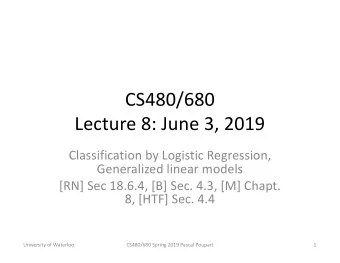
![CS480/680 Lecture 11: June 12, 2019 Kernel methods [D] Chap. 11 [B] Sec. 6.1, 6.2 [M] Sec.](https://c.sambuz.com/1002349/cs480-680-lecture-11-june-12-2019-s.webp)
![CS480/680 Lecture 18: July 8, 2019 Recurrent and Recursive Neural Networks [GBC] Chap. 10](https://c.sambuz.com/717990/cs480-680-lecture-18-july-8-2019-s.webp)
![CS480/680 Lecture 4: May 15, 2019 Statistical Learning [RN]: Sec 20.1, 20.2, [M]: Sec. 2.2, 3.2](https://c.sambuz.com/753766/cs480-680-lecture-4-may-15-2019-s.webp)
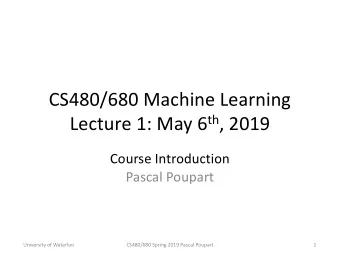
![CS480/680 Lecture 24: July 29, 2019 Gradient Boosting, Bagging, Decision Forest [RN] Sec. 18.10,](https://c.sambuz.com/864322/cs480-680-lecture-24-july-29-2019-s.webp)
![CS480/680 Lecture 22: July 22, 2019 Ensemble Learning [RN] Sec. 18.10, [M] Sec. 16.2.5, [B]](https://c.sambuz.com/894062/cs480-680-lecture-22-july-22-2019-s.webp)
![CS480/680 Lecture 2: May 8 th , 2019 Nearest Neighbour [RN] Sec. 18.8.1, [HTF] Sec. 2.3.2, [D]](https://c.sambuz.com/926633/cs480-680-lecture-2-may-8-th-2019-s.webp)
![CS480/680 Machine Learning Lecture 3: May 13, 2019 Linear Regression [RN] Sec. 18.6.1, [HTF]](https://c.sambuz.com/988148/cs480-680-machine-learning-lecture-3-may-13-2019-s.webp)
![CS480/680 Lecture 7: May 29, 2019 Classification with Mixture of Gaussians [B] Sections 4.2,](https://c.sambuz.com/997749/cs480-680-lecture-7-may-29-2019-s.webp)
